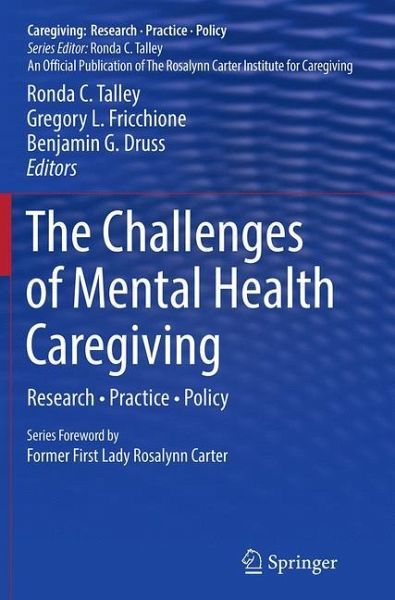
The Challenges of Mental Health Caregiving
Research ¿ Practice ¿ Policy
Herausgegeben: Talley, Ronda C.; Fricchione, Gregory L.; Druss, Benjamin G.
Versandkostenfrei!
Versandfertig in 6-10 Tagen
38,99 €
inkl. MwSt.

PAYBACK Punkte
19 °P sammeln!
Caring for the ill, disabled, very old, or very young requires a labor-intensive commitment that is not only essential to the well-being of individuals and to society as a whole, but also fraught with physical, financial, and psychological risks. And despite the critical nature of their job, caregivers rarely have avenues of support.The Challenges of Mental Health Caregiving addresses the complexities of the situation with uncommon depth and breadth. Suited to researchers, scientist-practitioners and clinicians, and students seeking a rounded understanding of the field, it examines how caregiv...
Caring for the ill, disabled, very old, or very young requires a labor-intensive commitment that is not only essential to the well-being of individuals and to society as a whole, but also fraught with physical, financial, and psychological risks. And despite the critical nature of their job, caregivers rarely have avenues of support.
The Challenges of Mental Health Caregiving addresses the complexities of the situation with uncommon depth and breadth. Suited to researchers, scientist-practitioners and clinicians, and students seeking a rounded understanding of the field, it examines how caregiving affects the lives, work, and mental health of family and professional caregivers. Chapters explore developmental, cultural, and spiritual contexts of care, addressing ongoing concerns about care in relation to larger health systems and emphasizing the need for care to be viewed as a community, rather than an individual or family experience. Further, the book's conclusion strongly advocates for more effective and efficient uses for available funds and resources while offering workable proposals for service improvements at the policy level.
Key areas of coverage:
The impact of caregiving on physical and mental health.Integrating mental health and primary care.The promotion of positive mental health outcomes in children and youth.Mid-life concerns and caregiver experience.Loss, grief, bereavement and the implications for mental health caregiving.Policy issues incaregiving and mental health.
The Challenges of Mental Health Caregiving is a clear-sighted reference for researchers, clinicians and scientist-practitioners, and graduate students in the caregiving fields, including clinical psychology, social work, public health/medicine, geriatrics/gerontology, public policy, and educational policy.
The Challenges of Mental Health Caregiving addresses the complexities of the situation with uncommon depth and breadth. Suited to researchers, scientist-practitioners and clinicians, and students seeking a rounded understanding of the field, it examines how caregiving affects the lives, work, and mental health of family and professional caregivers. Chapters explore developmental, cultural, and spiritual contexts of care, addressing ongoing concerns about care in relation to larger health systems and emphasizing the need for care to be viewed as a community, rather than an individual or family experience. Further, the book's conclusion strongly advocates for more effective and efficient uses for available funds and resources while offering workable proposals for service improvements at the policy level.
Key areas of coverage:
The impact of caregiving on physical and mental health.Integrating mental health and primary care.The promotion of positive mental health outcomes in children and youth.Mid-life concerns and caregiver experience.Loss, grief, bereavement and the implications for mental health caregiving.Policy issues incaregiving and mental health.
The Challenges of Mental Health Caregiving is a clear-sighted reference for researchers, clinicians and scientist-practitioners, and graduate students in the caregiving fields, including clinical psychology, social work, public health/medicine, geriatrics/gerontology, public policy, and educational policy.












